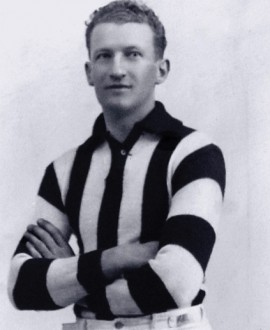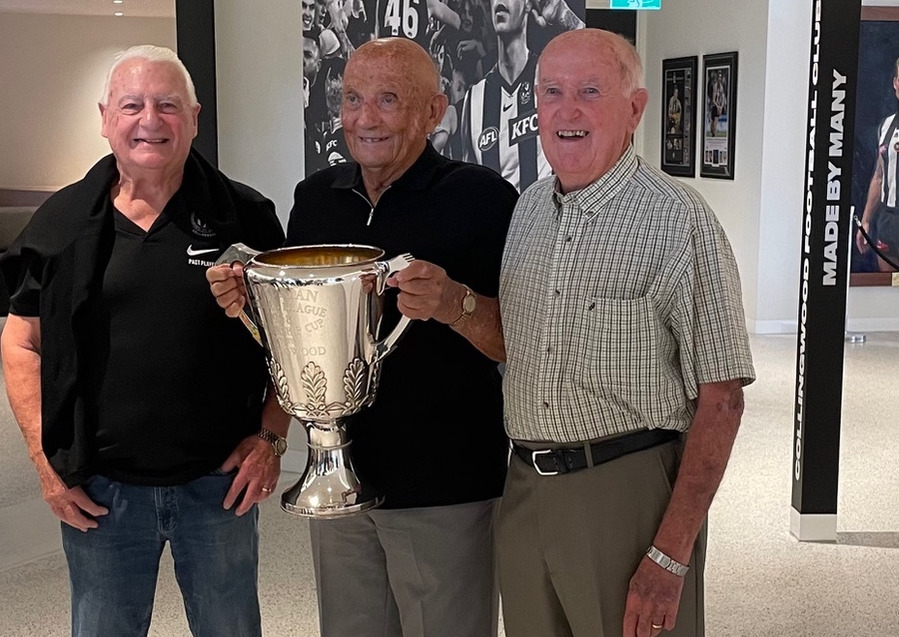

When talk turns to the game's great centre half-forwards, Frank Murphy's name is rarely mentioned. But those who saw him in action, or played alongside him, rated him in the top ranks, and talked glowingly of the role he played in Collingwood's Machine-era successes.
Gordon Coventry, who played at full-forward throughout Murphy’s career, is unequivocal: “In that position (centre half-forward) he was a champion,” Coventry wrote in The Sporting Globe in 1938. “For ten years he played in front of me, and could take credit for hundreds of the goals I scored. Murphy helped me in all the games when I scored a big bag of goals.
“Frank had great pace, while his marking was excellent,” Coventry commented. “He could kick with either foot, passing with a deadly accuracy. Whenever I saw he had a chance of getting the ball, I tore into the open and Murphy did the rest. His grand marking was followed up by a quick get-away that left opponents yards behind. He always seemed to be able to get balanced before he kicked, and I could always rely on the ball going to a position that would allow me to take it with ease.”
Frank's brother Len, himself a Collingwood teammate, added simply: “He was one of the best. He had a great pair of hands, was quick and clever and could do anything.”
Still, the fact that he remains an under-recognised cog in the Machine would have sat fine with Frank Murphy. A naturally quiet man who came from the country he neither sought, nor felt comfortable in, the limelight. When he left the field at the end of a game or training, Murphy liked to get away from football and those who talked about it. For much of his career he was actively involved with the Catholic Young Men’s Society at Thornbury, and he liked to throw himself into those activities in his spare time. He was popular with his teammates, yet his natural reticence probably cost him some of the recognition he was due.
Whether recognised or not, Murphy was a star. He stood 180cm (5ft 11in) tall, weighed about 74kg (list 9lb), and filled the key half forward post for most of his playing days at Collingwood. At times during his career he said that he wished he had a few extra pounds or inches to help contend with some of the big half backs to which he was frequently opposed.
But in a way his build was one of the secrets to his success. He was one of those players who “played tall”. He was, as Coventry said, a great mark for his size, and that enabled him to keep the bigger defenders more than honest. At the same time he was pacy and very agile, and that allowed him to run bigger blokes off their feet.
Murphy’s ground play was first class, and was backed by a tenacity which won him many kicks in the thick of play. He was also very quick at getting rid of the ball, but despite this always retained his accuracy whether short passing (as Coventry testified) or long shooting for goal. Perhaps most importantly of all he was consistent. Former teammate Percy Bowyer remembered him as “one of the most consistent players we had in those days”. For ten years Collingwood selectors never had to be concerned about the usually troublesome centre half-forward post, because they knew it was in good hands.
It had been that way virtually since Frank Murphy first set foot in Victoria Park prior to the 1925 season. He was born in Bairnsdale and went to school in the central Gippsland towns of Bruthen and Cowarr, where he got his first taste of football. At age 14 he moved to Melbourne and continued with his education at Bundoora. His father bought a farm at Mernda (near Whittlesea), and Frank played his first senior football with a local team there. Soon afterwards he became allied with the Thornbury CYMS team. He played with Thornbury for four years and his performances there were good enough to earn him a pre-season trial at Collingwood for 1925. He did well and was one of a number of recruits to be taken on that year.
Murphy had to wait until round seven, against St Kilda, to get his chance but then performed so well that he kept his place for the remainder of the season. Despite his late start to the year, he still won the club’s award for most consistent new player (a travel bag) and another for his game in one of the finals (a set of carvers).
So good were his performances in 1925 that Gordon Coventry rated it one of the best debut seasons he had ever seen. Coventry believed that the addition of Murphy had greatly strengthened the Collingwood forward line, and he was a regular in the starting 18 from that point. Despite this, he did not really come into his own until 1928. By this stage his on-field confidence had grown, he had become more assertive in his play and, consequently, he made huge strides as a footballer. Frank Murphy never really looked back. Now regarded as one of the established players, Murphy took on an additional role, nurturing the club’s young talent.
Frank also became involved in helping to organise some of Collingwood’s popular social activities, which were an intrinsic part of club life in those days. Frank Murphy loved dancing, and would often join Bowyer and some of the other lads at local dances.
Like Bowyer, Murphy was regarded as a thoroughly decent bloke both on and off the football field, and he was sadly missed in both capacities when he left to coach in Western Australia after managing only one game as a reserve in the 1934 season. Those famed Saturday night dances were not the same without him. Nor, it must be said, was Collingwood’s forward line.
- Michael Roberts
CFC Career Stats
| Season played | Games | Goals | Finals | Win % |
|---|---|---|---|---|
| 1925-1934 | 145 | 121 | 18 | 75.2% |
CFC Season by Season Stats
| Season | GP | GL | B | K | H | T | D | Guernsey No. | ||
|---|---|---|---|---|---|---|---|---|---|---|
Other CFC Games
| Team | League | Years Played | Games | Goals |
|---|---|---|---|---|
| Collingwood | Reserves | 1925 - 1934 | 8 | 0 |
Awards


 x4
x4






